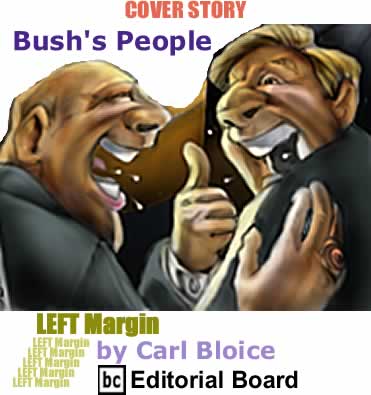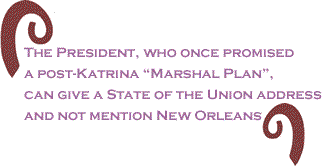
|
|||||||||||||||||||||
 |
|||||||||||||||||||||
 |
|
CNN business reporter Susan Lisovicz got really excited when the President arrived on the floor of the New York Stock Exchange last week. Explaining later to an anchor why she thought the President, whose public approval rating stood at 36 percent, had received a rapturous welcome on the exchange floor, she exuded: “These are his people.” Twenty-four hours later she was still gushing; she had become part of the story. When Lisovicz got close enough to the chief executive with her microphone to ask him how he felt about his reception he said he was “impressed and grateful.” “Do you think it's warmer than on Capitol Hill right now?”, she inquired, at which point he gave her “a suspicious glance” and “covered the microphone.” Lisovicz said she thought “his expression, his facial expression really gave the answer, not quite as sure, I think, as what the president of the United States indicated.” The people on the exchange floor were not just the young people you see at other times, eying the Big Board, holding fingers in the air and yelling transactions. These were business leaders, important people in the arena of national and world finance, applauding and maneuvering to get close enough to press the flesh. Bush’s people had reason to be of good cheer; the market was doing remarkable well that day and some of them would go home a lot richer than they were when they arrived. Think about it. Exxon Mobil Corp. reported it had turned in a profit of $39.5 billion last year, the largest corporate profit in the nation’s history, and its stock price rose 47 cents. Although its fourth quarter profits were down, primarily because of a decline in natural gas prices, Chevron, the country’s second largest oil company reported record earnings for the third year in a row. Natural gas price were a problem for third-largest ConocoPhillips too, but it recorded its most profitable year on record. Annual profits jumped by 21 percent at Shell to $25 billion. The people who own, manage and trade oil stocks could only be appreciative that day of an Administration so closely tied to the petroleum industry. Archer Daniels Midland Co., the giant agribusiness firm – largest in the country - who stands to gain big-time from the President’s plan to turn large swaths of the Midwest into an ethanol producing plant in the name of energy independence, saw its stock price rise over 10 percent after reporting a 20 percent jump in profits, mostly from processing corn.
The stock price for Boeing Co. reached an all-time high that day, up $1.47 to $91.03. It’s been doing quite well, in large part as a result of orders for military aircraft. They could not have been unmindful that the foreign policy of the current Administration, from the Persian Gulf to the Horn of Africa, portends the necessity of even larger military outlays in the future. Not any more than the folks at Mobil could forget that the military conflicts the Administration has provoked are closely tied to the economics of oil. One estimate is that, over the past six years, over $3 billion has flowed into the coffers of the military and oil industries. Ever wonder why, in the face of overwhelming scientific opinion, Bush continues his stubborn resistance to accept and act on the danger of global warming? Consider this: The Guardian (UK) reported February 2 that “Scientists and economists have been offered $10,000 each by a lobby group funded by one of the world's largest oil companies to undermine a major climate change report due to be published today.” The letters were from the American Enterprise Institute (AEI); the oil company is ExxonMobil. AEI has received more than $1.6m from ExxonMobil and more than 20 of its staff have worked as consultants to the Bush administration. Lee Raymond, a former head of ExxonMobil, is the vice-chairman of AEI's board of trustees. AEI just happens to be the brain trust for the Administration’s Iraq policy and the source of the new “surge” project. "ExxonMobil's outlandish profits are the direct result of a Bush energy policy that for seven years has used every lever of the American government to tilt the scales towards satisfying the special interest demands of a single industry at the expense of the public interest," Rep. Ed Markey (D.-Mass.) told the Associate Press. Yes, these were Bush’s people: the masters of finance, agribusiness and the military-industrial complex and they had reason to cheer. Never mind that the number of young women and men killed in the war in Iraq had reached 3,092. Never mind that hundreds of thousands of people had taken to the streets of Mexico City because the new economics of corn production has driven up the price of tortillas, threatening their livelihood; that they were demanding that revision be made in the “free trade” agreement that made it possible for the U.S. traders to raise the price to control a large portion of their food market. Never mind that when the new U.S. employment figures were released two days after hoopla on the trading floor, unemployment had held pretty steady but the joblessness rate for young African Americans in January reached 29.1 percent, up from 26.2 percent in December, even though black unemployment overall had declined somewhat. Never mind that with our economy, considered to be the engine for the world economy, we cannot marshal the resources necessary to guarantee the people, whose lives were disrupted and decimated by hurricane Katrina, that they can once again live in a viable community. Or that the President, who once promised a post-Katrina “Marshal Plan”, can give a State of the Union address and not mention New Orleans.
Yes, for those cheering on the Stock Exchange floor, the economy is doing well. The problem is that the high profits being engendered are not being shared proportionately. There is what the Nation magazine termed, “The destructive inequalities embedded in our supposedly healthy economy” and increasing economic insecurity of the country’s working people. The President is acutely aware that as he tries to shift the public debate from his disastrous foreign policies to the resilience of the economy, the inequities of the returns hangs over anything he may say. He is aware that there is widespread public recognition that the policies he has pursued have – to put it simply – benefited those who need more money the least rather than those who need it most. That extends from his tax cuts for the well-to-do, his healthcare plan, which is really a new tax on working people, to his latest schemes to reduce Medicare benefits. In his address to the business executives gathered in nearby Federal Hall for his homage to Wall Street, the President actually addressed the question of economic inequality. This is kind of interesting, seeing as how his right wing supporters are diligently trying to justify it by either suggesting it is a good and natural thing or attacking critics as promoting the “politics of envy.” "The fact is that income inequality is real. It has been rising for more than 25 years," the president said. "The earnings gap is now twice as wide as it was in 1980," Bush said. However, the only prescription he offered for dealing with the problem was to provide for more and better education, a dubious proposition at best. Later in his remarks, the President addressed the matter of executive compensation, noting that it has prompted concern and anger within the ranks of investors. "Government should not decide the compensation for America's corporate executives," he said. "But the salaries and bonuses of CEOs should be based on their success at improving their companies and bringing value to their shareholders." The corporate executives were not impressed with even that toothless invocation. The remark, reported AP, was “met with complete silence from the business crowd he addressed.”
Excessive CEO pay has reached outrageous proportions and investors, as well as working people, are justifiably outraged. But that is only a sideshow compared with what’s going on under the big tent. There, economic inequality is reflected in the very simple fact that there is a continuing massive shift of wealth toward the top, that the wealth being created is going in lesser amounts to the women and men whose labor produced it. "The president is right,” Mark Zandi, chief economist at Moody's Economy.com, told the AP. “The economy in aggregate is performing very well. So he's right to claim that the economy, looking from above, looks very good," Zandi said. "Democrats are also right. The fruits of this strong economy have largely accrued to higher income wealthier households." “President Bush came to Wall Street yesterday to tout the continuing good economic news, and afterward he sat down for 45 minutes with a few members of this newspaper's editorial board,” reported the Wall Street Journal. “If Mr. Bush is beaten down by the polls and his party's loss of Congress, he isn't showing it.” Some of my friends have taken to wondering out loud: if President Bush has one of the lowest approval ratings in U.S. Presidential history and his policies are being questioned by most of the big business media and leading members of his own party, who’s in his camp? The answer, my friends, was there on the trading room floor January 31. Those are Bush’s people. And right now they rule. BC Editorial Board member Carl Bloice is a writer in San Francisco, a member of the National Coordinating Committee of the Committees of Correspondence for Democracy and Socialism and formerly worked for a healthcare union. Click here to contact Mr. Bloice. |
|
| Home | |
| February 8, 2007 Issue 216 |
||||||||||||||
|
||||||||||||||
| Printer Friendly Version in resizeable plain text format | ||||||||||||||
 |
||||||||||||||
|
||||||||||||||
 |
||||||||||||||
 |
||||||||||||||
 |
||||||||||||||
| |
||||||||||||||
| |
||||||||||||||































